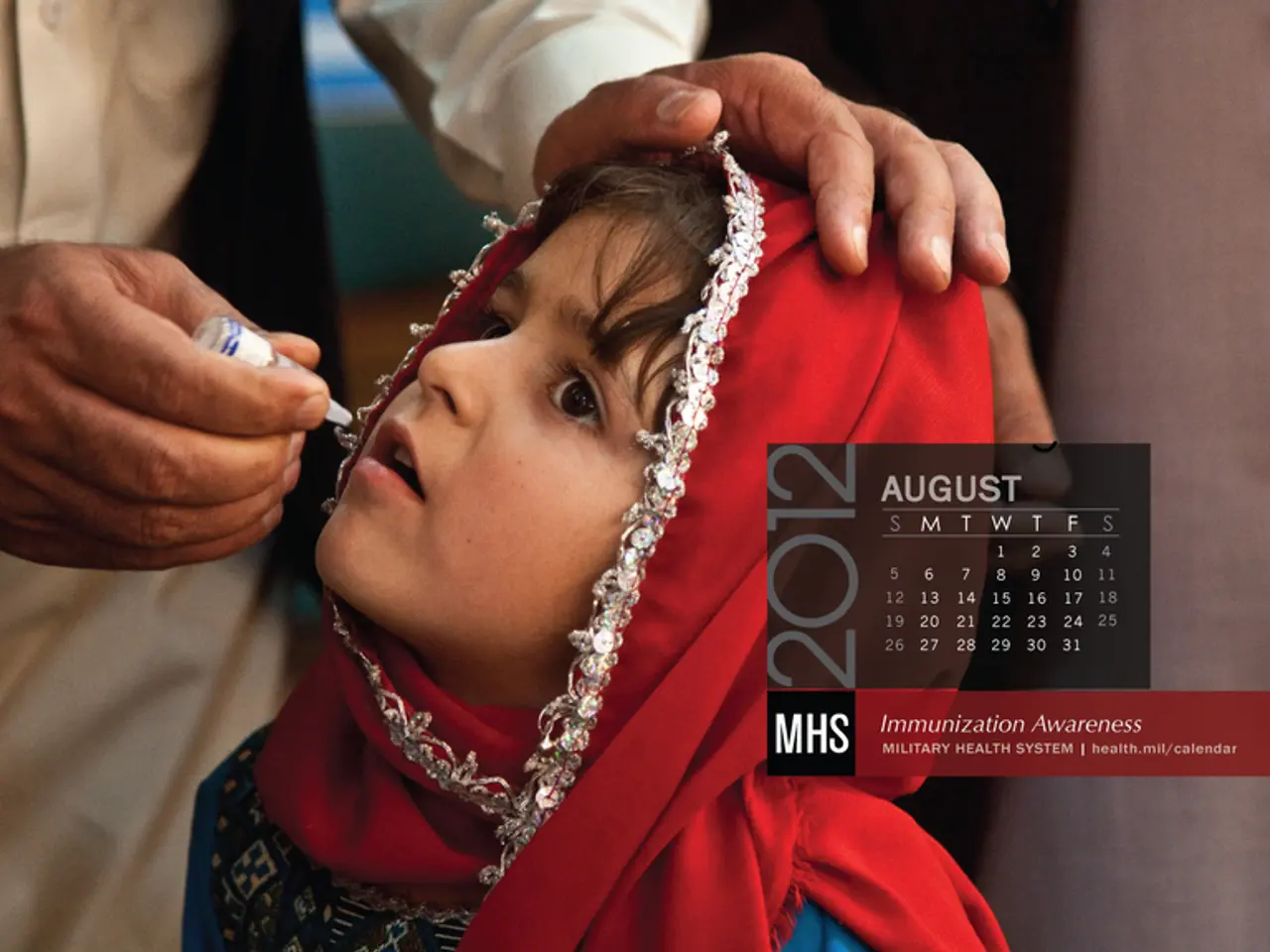Confirmation of the 19th Polio Case in the Year 2025 in Pakistan
Pakistan Faces Continued Polio Outbreaks, with Khyber Pakhtunkhwa Remaining a Hotspot
A five-month-old child in Pakistan's Khyber Pakhtunkhwa province has tested positive for polio, marking the 12th case in the province for 2025. This latest case was confirmed by the National Institute of Health (NIH) in Islamabad on Thursday.
The polio outbreak in Pakistan has been particularly severe in the southern districts of Khyber Pakhtunkhwa, according to the polio programme. The area has faced restricted access, a lack of female vaccinators, and operational challenges in conducting house-to-house vaccination.
The child, from the Suleman Khel Union Council of Ghazni Khel Tehsil, Lakki Marwat district, had not received the routine polio immunization and was only administered a single supplementary dose. This is the third polio case reported from Lakki Marwat district in 2025, compared to two cases in 2024.
Pakistan and Afghanistan are the only two countries where polio remains endemic, according to the World Health Organisation. The source of the polio outbreak in Khyber Pakhtunkhwa is not specified in the article.
The polio case in Khyber Pakhtunkhwa is the first for the province in 2025. It is important to note that, in 2023, Pakistan reported six cases of polio and only one in 2021.
Efforts to eradicate polio in Pakistan have been repeatedly undermined by vaccine misinformation and resistance from some religious hard-liners. In Khyber Pakhtunkhwa and other provinces, militants often target vaccination teams, branding them as Western conspiracies, and have killed healthcare workers and security personnel during campaigns. This hostility disrupts vaccination efforts and deters access to vulnerable populations.
The vaccine gaps leading to a surge in measles and polio cases in Pakistan, particularly in Khyber Pakhtunkhwa, stem from several interconnected factors. These include low immunization coverage and vaccine dropouts, security challenges and targeted attacks, misinformation and religious opposition, cross-border migration, genetic diversity and persistent virus reservoirs, funding and infrastructure gaps, and operational challenges in conducting house-to-house vaccination.
In response to the ongoing polio outbreak, a special vaccination campaign was held from July 21-27 in the bordering area of Khyber Pakhtunkhwa and Baluchistan to coincide with Afghanistan's sub-national polio campaign.
It is crucial for the Pakistani government and international health organisations to address these factors to prevent further outbreaks and eradicate polio in the country.
References:
- Polio Outbreak in Pakistan: Causes and Challenges
- Pakistan's Immunization Programme: Challenges and Opportunities
- Polio in Pakistan: The Role of Vaccine Misinformation and Security Challenges
- Polio in Pakistan: Militant Threats and Vaccine Resistance
- Measles and Polio Outbreaks in Pakistan: Causes and Solutions
- The continued polio outbreaks in Pakistan highlight the importance of healthcare and medical-conditions in achieving global health.
- Health and wellness, particularly for children, are crucial in preventing chronic diseases like polio.
- Science and environmental-science play a significant role in understanding the causes and transmission of polio.
- Sleep and fatigue can weaken the body's immune system and increase vulnerability to respiratory-conditions like polio.
- Workplace-wellness programs can educate employees about the importance of vaccinations and preventive measures.
- Ignorance about medical-conditions and vaccine misinformation can lead to the persistence of diseases like polio.
- The handling and storage of vaccines are essential aspects in the fight against diseases like polio, which fall under therapies-and-treatments.
- Proper nutrition is vital for a strong immune system and overall health, which can help prevent diseases like polio.
- Cancé research and treatments are advanced in many countries, but resources are needed to combat polio in Pakistan.
- The rise of digital platforms can help disseminate accurate information about diseases like polio and debunk misconceptions.
- Digitalization in healthcare can also improve vaccination management and tracking in areas like Khyber Pakhtunkhwa.
- The agenda for workplace-wellness can include mental-health initiatives to combat stress and anxiety that may hinder vaccination uptake.
- Men's health and women's health are equally important in ensuring the overall health of Pakistan's population.
- Skin-care practices can help prevent infections and promote general health, which can aid in the fight against polio.
- Aging populations require specialized health care and attention, and robust systems are necessary to address diseases like polio.
- Sexual-health education can promote a healthy lifestyle and aid in the prevention of diseases like polio.
- Autoimmune-disorders can weaken the body's immune system and make individuals more susceptible to diseases like polio.
- Climate-change can lead to changes in water supplies and housing conditions, which may impact polio transmission.
- The manufacturing industry can develop more sustainable and cost-effective solutions for producing and distributing vaccines.
- Industry, including healthcare, should prioritize diversity-and-inclusion to ensure equitable vaccine access for all.
- Mental-health initiatives can help boost resilience and coping mechanisms, which can be useful for those working in high-pressure environments, like healthcare.
- Finance plays a crucial role in funding health programs, eradicating diseases like polio, and improving general health and wellness.
- Energy can be used to power vaccination facilities and cold chains, ensuring the availability and effectiveness of vaccines.
- As skin-conditions can lead to infections, proper skincare is essential for overall health and preventing diseases like polio.
- Space-and-astronomy research and development can have indirect benefits for health, such as advancements in technologies for diagnosing and treating diseases.
- Aerospace initiatives can contribute to the development of innovative healthcare solutions, like drones for vaccine delivery in remote areas.
- The retail sector can play a role in promoting health and wellness through educational initiatives and sales of health-related products.
- Entrepreneurship, leadership, and innovation are necessary to develop effective solutions for addressing health issues like polio and improving the overall health of Pakistan's population.




